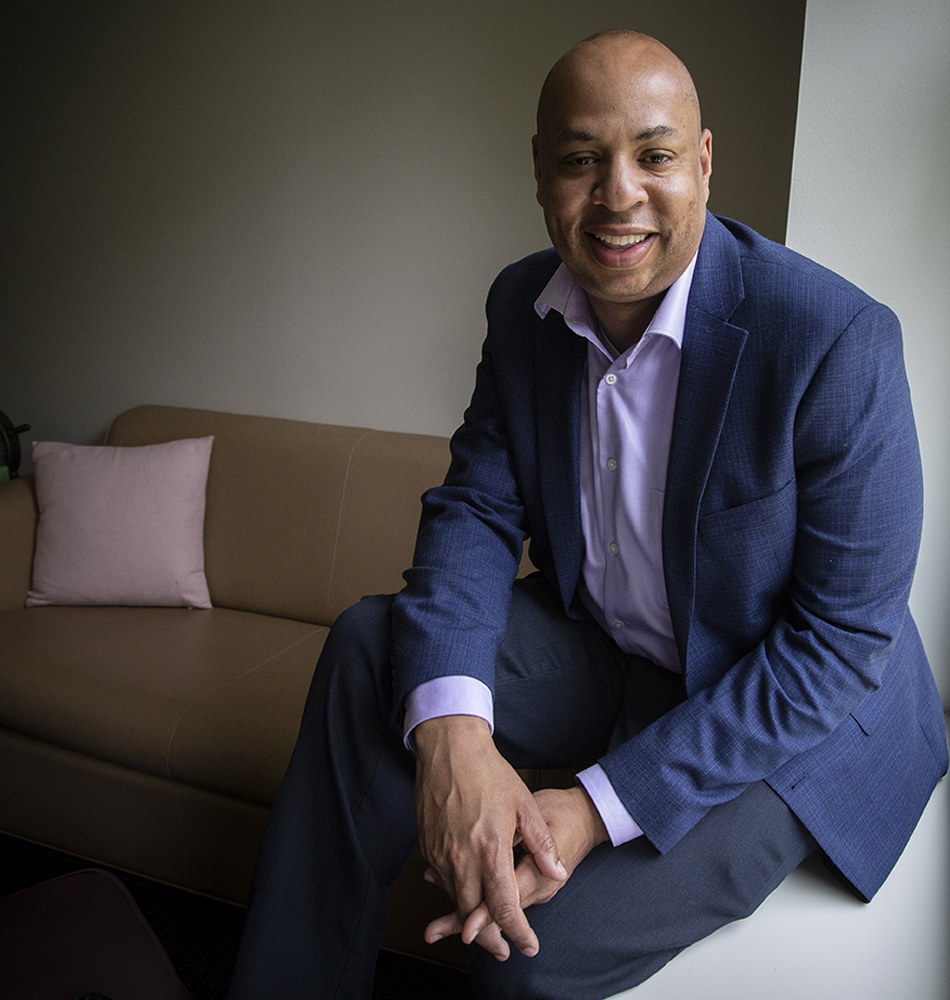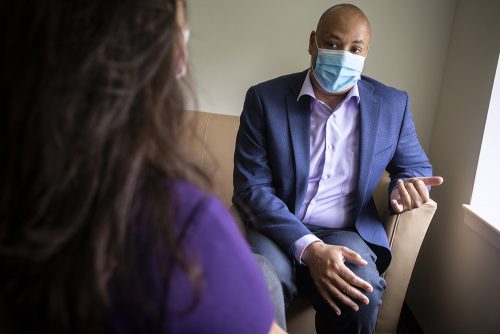Easing Student Stress: A Q&A with Eric Wood
The director of counseling and mental health says colleges must support students.

Eric Wood, director of TCU's Counseling & Mental Health Center, says college can be an especially trying time for students. Photo by Joyce Marshall
Easing Student Stress: A Q&A with Eric Wood
The director of counseling and mental health says colleges must support students.
TCU has the Counseling & Mental Health Center. Why is it TCU’s responsibility to care for the mental health of students?
Some schools don’t — their belief is that mental health is a personal issue, and students have to deal with it on their own. But colleges are dealing with a population that is on an increase for mental health issues. Most emerging mental health issues are going to happen between 18 and 24. We have this huge population, and we know the prevalence rate is so high, and we’re talking about serious things. There is that ethical perspective.
Two, it’s a belief that anything that affects the person affects them as a learner.
“College is one of the few times where, for some students, everything in their life can change.”
Eric Wood
Not only do you have emerging psychological disorders, but the students are also in a development transition. College is one of the few times where, for some students, everything in their life can change — relationships with friends and parents, where they’re living, class schedule. It’s really like a perfect storm. And then sometimes college students do high-risk stuff like drinking. A lot could go wrong.
We’re asking families to send their student here, to live here, sometimes from thousands of miles away. We’re charging ourselves with the care of the student. We have to support them.
Political upheaval, the pandemic, social unrest — all of these things are brewing inside the heads of this population. How are you supposed to help with these huge and complex issues?
A lot of students don’t know what their reaction is. We have training about emotional trauma, and especially culture-based trauma. We did it for students, for faculty, staff and the Chancellor’s Cabinet. It’s an awareness training that helped them articulate what was going on, why they were having an emotional trauma reaction. That’s why they were in a bad mood at home, why they couldn’t sleep, why they’re having anxiety.
People think of trauma as something violent and physical, but there is an emotional trauma that is just as painful and just as destructive.

Eric Wood, the director of counseling and mental health at TCU, says it’s important to provide resources to a vulnerable student population. Photo by Joyce Marshall
Our students are smart and ambitious. But asking for help can be a struggle. They think they can just do it all. They’re so used to achieving. The idea that something’s bigger than them and they need help is a new concept. The whole global community went through a traumatic year. If you’re a part of that world, you are subject to emotional trauma. What we know about trauma is that it does respond to intervention, but if you don’t get help, as Dr. Brian Dixon, an assistant professor of psychiatry at the TCU and UNTHSC School of Medicine, says in our training, “Trauma begets trauma begets trauma.”
If you don’t get help, the likelihood that it affects other areas of your life is really high. But it’s also likely that you might be traumatizing someone else. Our message to students is that this is the year none of them can say, “We got this.” We’ve all had trauma. If there is ever a time to get help, this would be the time.
There are resources at TCU. I’m biased, of course, but I really do feel that we have more resources than a lot of other schools, even schools larger than ours.
Language around mental health has changed over the decades, and new research comes out all the time. How is TCU staying abreast of the services it provides?
“We’ve all had trauma. If there is ever a time to get help, this would be the time.”
Eric Wood
I think we’re one of the leaders in the field. National organizations share innovations and development. We have statewide and national organizations for college counseling centers. At the training we did about peer support groups, 70 schools showed up, and they were all from the national organization. They would say they use us to find innovations about support. TCU is in an important place because people in those organizations look toward us. Being part of the Substance Abuse and Mental Health Services Administration grant, which we received twice, means we get to host trainings and share the information we gathered.
Editor’s Note: The questions and answers have been edited for length and clarity.

Your comments are welcome
Comments
Related reading:
Caring for the Whole Student
TCU’s Counseling & Mental Health Center supports students in innovative ways.
Alumni, Features
Generation Z Embraces Therapy
Parents often resist the counseling that their children welcome.
Honoring 9/11 Memories
Twenty years later, those with the closest ties to 9/11 are still picking up the pieces.